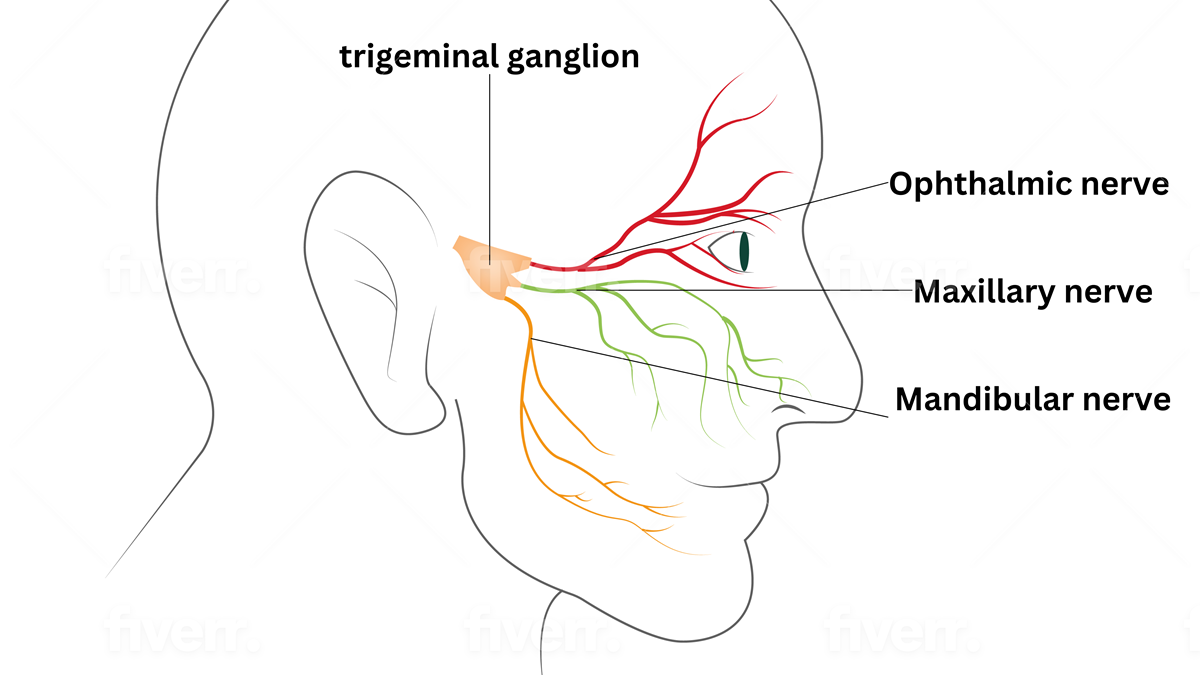Nerves in the Head and Neck - Trigeminal Nerve
The Trigeminal Nerve
The trigeminal nerve is one of twelve nerves that leave the brain via holes in the skull. These nerves are known as cranial nerves and are numbered. The trigeminal nerve is the 5th cranial nerve. Like all cranial nerves, the trigeminal nerve is a pair with one on each side of the head (1).
It leaves the skull through a hole in front of the ear and splits into three branches that lead to different parts of the face, as shown in the diagram. These are the ophthalmic nerve, the maxillary nerve, and the mandibular nerve (1).
The trigeminal nerve is mainly a sensory nerve- this means it carries information about sensations to the brain. It does also have some motor functions- this means it carries signals from the brain that tell muscles to move (1).
The ophthalmic nerve is a sensory branch and carries sensations from the top part of the face including the area around the eye. It also carries sensations from the outside of the eyeball itself. However, it is not responsible for eyesight and damage to the nerve does not result in loss of vision (1).
The maxillary nerve is also a sensory branch and carries sensations from the middle part of the face around the cheeks and nose. It is not responsible for sense of smell and damage to the nerve does not result in loss of smell (1).
The mandibular nerve is both a sensory and motor branch. It carries sensations from the lower part of the face around the jaw and mouth. It also supplies the muscles used for chewing and is needed to chew (1).
The trigeminal nerve passes close to the parotid salivary gland in front of the ear and can be affected by cancers growing in that gland. If these cancers press on the nerve and squish it or grow along the nerve, it can cause damage to the nerve that results in changes to the sensation of the face. At the severe end, this can result in the complete loss of sensation. Damage to the nerve can also affect the ability to chew (1;2).
Nerves heal very poorly, and that damage can become permanent after only a short period of time. Damage to the nerve is often very painful and the trigeminal nerve is notorious for the severity of pain if it is damaged (3).
As each side of the face has a different trigeminal nerve, damage to one nerve will only affect one side of the face. Surgery and/or radiotherapy to salivary gland tumours close to the trigeminal nerve can also cause damage to the nerve with similar effects to when the cancer attacks the nerve (4;5).
Adenoid cystic carcinoma is particularly likely to affect the nerves of the face with most adenoid cystic carcinomas attacking nerves (6). The trigeminal nerve is one of the most commonly affected nerves by adenoid cystic carcinoma (2).
References:
1. Huff T, Weisbrod LJ, Daly DT. Neuroanatomy, Cranial Nerve 5 (Trigeminal) [Updated 2024 Apr 20]. In: StatPearls [Internet]. Treasure Island (FL): StatPearls Publishing; 2024 Jan-. Available from: https://www.ncbi.nlm.nih.gov/books/NBK482283/
2. Dankbaar, J.W., Pameijer, F.A., Hendrikse, J. et al. Easily detected signs of perineural tumour spread in head and neck cancer. Insights Imaging 9, 1089–1095 (2018). https://doi.org/10.1007/s13244-018-0672-8
3. Bendtsen L, Zakrzewska JM, Heinskou TB, Hodaie M, Leal PRL, Nurmikko T, Obermann M, Cruccu G, Maarbjerg S. Advances in diagnosis, classification, pathophysiology, and management of trigeminal neuralgia. Lancet Neurol. 2020 Sep;19(9):784-796. doi: 10.1016/S1474-4422(20)30233-7. PMID: 32822636.
4. Chen LP, Li D, Li XJ, Song LR, Zhang LW, Wu Z, Zhang JT, Wang L. Postoperative trigeminal neuropathy outcomes following surgery for tumors involving the trigeminal nerve. Acta Neurochir (Wien). 2023 Oct;165(10):2885-2893. doi: 10.1007/s00701-023-05735-y. Epub 2023 Aug 15. PMID: 37581723.
5. Azzam Patrick, Mroueh Manal, Francis Marina, Abou Daher Alaa, Zeidan Youssef H (2020) Radiation-induced neuropathies in head and neck cancer: prevention and treatment modalities ecancer 14 1133
6. DeAngelis AF, Tsui A, Wiesenfeld D, Chandu A. Outcomes of patients with adenoid cystic carcinoma of the minor salivary glands. Int J Oral Maxillofac Surg. 2011 Jul;40(7):710-4. doi: 10.1016/j.ijom.2011.02.010. Epub 2011 Mar 10. PMID: 21396798.

